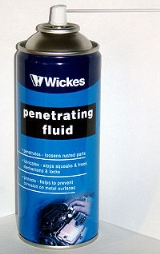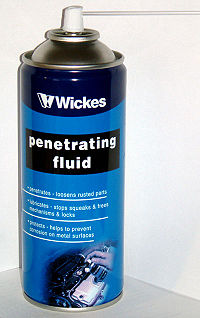
Penetrating oil
Encyclopedia

Viscosity
Viscosity is a measure of the resistance of a fluid which is being deformed by either shear or tensile stress. In everyday terms , viscosity is "thickness" or "internal friction". Thus, water is "thin", having a lower viscosity, while honey is "thick", having a higher viscosity...
oil
Oil
An oil is any substance that is liquid at ambient temperatures and does not mix with water but may mix with other oils and organic solvents. This general definition includes vegetable oils, volatile essential oils, petrochemical oils, and synthetic oils....
. It can be used to free rusted mechanical parts (such as nuts and bolts) so that they can be removed, because it can penetrate into the narrow space between the threads of two parts. It can also be used as a general-purpose lubricant
Lubricant
A lubricant is a substance introduced to reduce friction between moving surfaces. It may also have the function of transporting foreign particles and of distributing heat...
, a cleaner, or a corrosion
Corrosion
Corrosion is the disintegration of an engineered material into its constituent atoms due to chemical reactions with its surroundings. In the most common use of the word, this means electrochemical oxidation of metals in reaction with an oxidant such as oxygen...
stopper. Using penetrating fluids as general-purpose lubricants is not advisable, because such oils are relatively volatile
Volatility (chemistry)
In chemistry and physics, volatility is the tendency of a substance to vaporize. Volatility is directly related to a substance's vapor pressure. At a given temperature, a substance with higher vapor pressure vaporizes more readily than a substance with a lower vapor pressure.The term is primarily...
. As a result, much of the penetrating oil will evaporate in a short amount of time, leaving little residual lubricant. However, this is not true of certain formulations (such as WD-40
WD-40
WD-40 is the trademark name of a United States-made water-displacing spray. It was developed in 1953 by Norm Larsen, founder of the Rocket Chemical Company, San Diego, California. It was originally designed to repel water and prevent corrosion, and later was found to have numerous household...
) which contain a non-volatile lubricating component.
Other uses include: removing chewing gum and adhesive stickers, lessening friction on metal-stringed musical instruments, displacing moisture on and within electrical ignition systems, various gardening purposes and household repair tasks.

